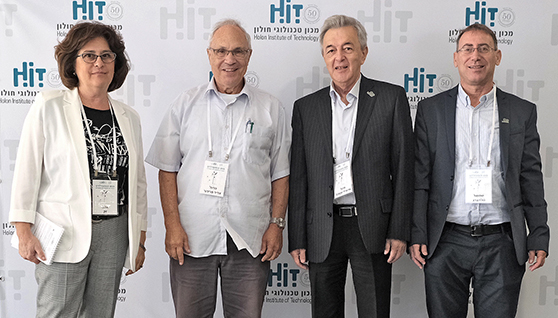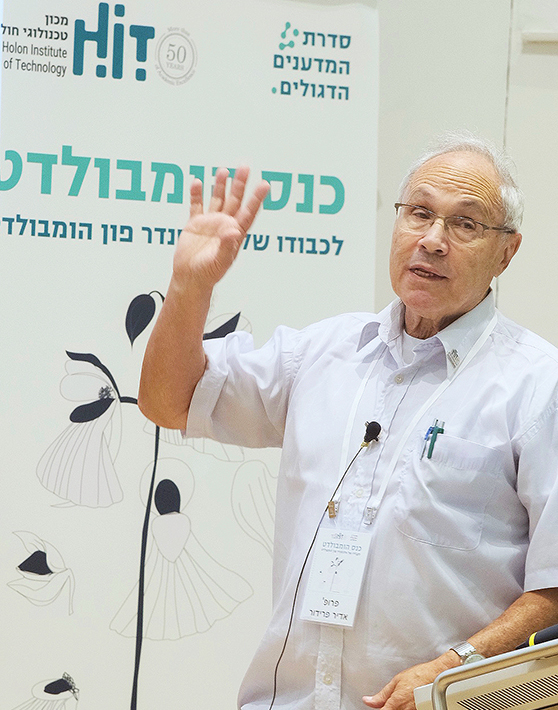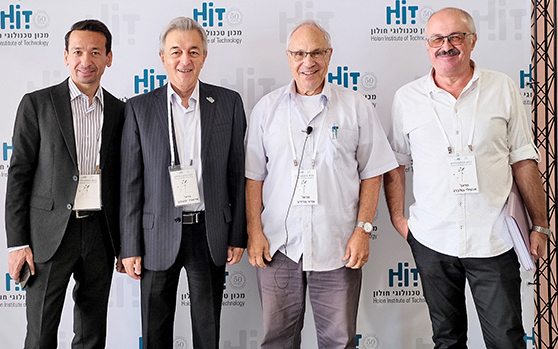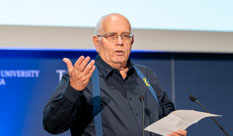More:
News & Stories
A conference in honor of Alexander von Humboldt at HIT
The Great Scientist Series pays tribute to the visionary ‘Father of Ecology’ Alexander Von Humboldt.

From the right: Mr. Samuel Goldberg, Prof. Eduard Yakubov, Prof. Adir Pridor, Prof. Alla Zak.
Photo: Bar Kalush
Centuries ahead of his time, Humboldt set the foundations for the field of geobotany, describing vegetation zones and climate using latitude and altitude, as well as human-caused climate change.
The far-ranging studies of Von Humboldt were explored at length and in depth at the fourth conference of the Great Scientist Series, an annual event that focuses on scientists who changed the world. The Series sheds light on the lasting contribution of scientists over the ages whose work is still relevant in contemporary times. To date, the series has included conferences highlighting the works of Isaac Newton, Leonardo da Vinci and Archimedes.
Initiated by Prof. Adir Pridor, Chairman of HIT's Executive Committee, the Humboldt Conference revealed the vast body of work of one of the most unique and multidisciplinary scientists in history.

Prof. Adir Pridor. Photo: Bar Kalush
Born in Berlin in 1769, Humboldt was a renaissance man, whose explorations in Latin America and other areas contributed greatly to our understand of botany. In his research expeditions, he discovered hundreds of new plants and animal species, and documented remote cultures. He warned about pollution, deforestation and environmental degradation even in his own time, and understood the connections between environmental destruction and the climate. In this, Humboldt anticipated Charles Darwin’s famous idea of an entangled bank of connections in the web of life, also recognizing that organisms have a reciprocal effect on their environment.

From the right: Prof. Anatoly Golberg, Prof. Adir Pridor, Prof. Eduard Yakubov, Dr. Nodir Narzeiv.
Photo: Bar Kalush
In his opening remarks, Prof. Eduard Yakubov, President of HIT, shared his view that what makes a scientist great is his influence and significant contribution to the advancement of humanity. According to Yakubov, Humboldt demonstrated this through the multidisciplinary approach to his work. This perspective dovetails with the vision of HIT which encourages a multidisciplinary approach to DSTEM disciplines – Design, Science, Technology, Engineering and Medicine. "We believe that the continued existence of the State of Israel as a technological power is also dependent on science and technology, and HIT is proud to host these kinds of conferences which showcase this approach.”
Posted: 08/11/2022
- News & Events
New Collaboration with Sheba Medical Center will qualify nurses to work in a digital environment.
Collaboration between HIT Holon Institute of Technology, the teaching authority of the Sheba Medical Center, and the Sheba-BEYOND virtual hospital will allow training nurses in Israel and around the world to work in a digital...



 Additional programs
Additional programs
